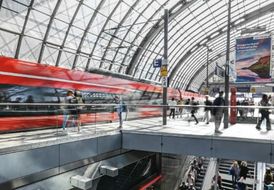Employment conditions
We are continuing to improve employment conditions, based on current and future social developments, as well as employees’ and applicants’ expectations of a modern employer. Issues such as flexibility, participation and individualization are highly important. Further developments are communicated to employees in a way that is tailored to the target audience, and feedback is provided on the aspects of employment conditions. The respective interest groups are always involved in the further development.
In May 2020, we signed the Alliance for Our Railway (2020 Integrated Report). Against this backdrop, we reached an agreement with the EVG on a comprehensive collective bargaining package in September 2020. In addition to regulations for moderate wage increases in 2022 and a period up to February 2023, the overall package includes numerous agreements on relevant topics for the future. After further negotiations, we reached an agreement with the EVG in October 2021 on additional obligations arising from collective bargaining agreements that supplement the agreements on the Alliance for Our Railway:
- In addition to a pay increase of 1.5% as of January 1, 2022, these include extended protection against dismissal for employees. The agreements have a total term of 24 months to February 2023.
After several rounds of negotiations, we reached a wage agreement with the GDL in September 2021:
- As an example, remuneration will increase by 1.5% as of December 1, 2021, and by a further 1.8% on March 1, 2023. A total term of 32 months was agreed between March 2021 and October 2023.
We acknowledge social changes and the wishes of employees when organizing working hours. Our efforts to continuously improve flexibility in working hours help to increase our attractiveness as an employer and are therefore of great importance for employee retention and recruitment.
- With the elective working hours model, employees can decide whether to reduce their working hours by one or two hours per week, take six or 12 additional vacation days per year or receive a higher salary.
- Our employees have several options for their use of overtime. In addition to the classic options of leave or remuneration, employees covered by collective bargaining agreements can add time credit from overtime, as well as vacation days and remuneration, to an individual long-term account and take paid leave at a later date. Care is taken to ensure that statutory regulations concerning working hours are observed. In addition, overtime is only possible with both parties’ consent.
- With employer-financed contributions to the DEVK pension fund, DB Group offers an attractive retirement pension to supplement the statutory pension.
- Employees covered by collective bargaining agreements are also able to convert time credits from overtime or additional vacation for rotating shift work, shift work and night work, into the company pension plan (CPPs) in full or in part, allowing them to save for their retirement.
- Both models (contribution to a long-term account and conversion to the CPP) are additionally supported by DB Group.
- In the companies with shift and rotating shift work, we are strengthening the participation of employees in the planning and individualization of working hours within the framework of operational working hours projects.
Further information can be found in the section Social and fringe benefits section.
With our digital housing exchange, we are making it easier for our employees to access affordable housing. At the same time, we have intensified our cooperation with housing companies and updated contractual terms. We concluded cooperation agreements with six housing companies that provide our employees with access to a pool of about 600,000 apartments. When selecting cooperation partners, we pay attention to the average rent levels as well as the location of the apartments. In addition, we analyze the needs of our employees in order to be able to plan specific housing projects in the future and implement them if necessary.
We aim to offer our employees a varied, green, flexible and simple mobility portfolio that consists primarily of DB’s own services. DB company bikes, an employee discount for our bike sharing service Call a Bike and the travel discounts form the foundation for this. Employees not subject to collective wage agreements and executive employees can also use our Flinkster car-sharing service and choose BahnCard 100 instead of a company car. We also provide our employees with access to favorable offers for the monthly transport association job ticket for their commute to work and finance these in part or in full, depending on the specific circumstances.
We were able to guarantee important mobility services throughout the Covid-19 pandemic. Our crisis management team in the area of occupational health management in particular has played an important role in this regard. With its activities and protective measures, our occupational health management follows the German National Pandemic Plan, the occupational health and safety regulations of the Federal Ministry of Labor and Social Affairs (Bundesministerium für Arbeit und Soziales; BMAS), and the precautionary recommendations of the Robert Koch Institute. The objectives of the crisis management team include minimizing the risk of infection at the workplace, maintaining operational processes, maintaining operational infrastructure and ensuring basic supply.
The digitalization of health services also makes a contribution to the design of modern employment conditions in this context. In addition, the follow-on effects of the Covid-19 pandemic are a particular focus, such as long-Covid or post-Covid, or ergonomics in the mobile workplace. To address this and for ergonomic advice, offers were developed with the help of the social partnership with the BSW&EWH Foundation Family (Stiftungsfamilie BSW&EWH), the Association of German Railway Sports Associations (Verband Deutscher Eisenbahner-Sportvereine; VDES), BAHN-BKK and Knappschaft-Bahn-See (KBS Social insurance for railway employees and seafarers).
We support the health of our employees from a holistic perspective and combine targeted offers for physical, mental and social health through company medical care and occupational psychological care. This covers, for example, stress management, exercise, nutrition and professional support for mental disorders. In particular, when dealing with occupational trauma after work accidents, we have a wide range of internal care services and quick access to prompt external emergency psychological care.
Further information can be found in the section Occupational safety and health management.
In order to support the Covid-19 vaccine campaign in Germany, our employees were offered vaccines in-house. To this end, we have set up our own vaccine centers at ten central locations and operate these independently with the support of the company medical service providers PIMA and ASAM prevent. In addition, in 2023, we will offer all Covid-19 vaccines, from basic immunization to third booster vaccines in accordance with the Standing Committee on Vaccination (STIKO) recommendations at 20 health centers of our company medical service provider ias AG.
We are consistently taking further steps towards establishing new and flexible forms of collaboration. In summer 2021, the fundamental decision was made to anchor mobile working into our everyday work for employees and executives with office activities. In addition, desk sharing and an activity-oriented office concept are being gradually introduced at all office locations throughout Germany. In 2022, executives were made responsible for jointly defining the form their future cooperation takes together with their teams. For this purpose, an appropriate decentralized process for team agreements was rolled out, which was accompanied by a large number of different change activities and formats in the business units. In this way, we support our orientation in the new hybrid working environment and strengthen participation.


